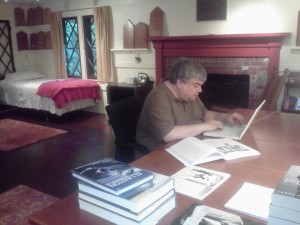Here’s my list of recommended Broadway, off-Broadway, and out-of-town shows, updated weekly. In all cases, I gave these shows favorable reviews (if sometimes qualifiedly so) in The Wall Street Journal when they opened. For more information, click on the title.
BROADWAY:
• An American in Paris (musical, G, too complex for small children, nearly all performances sold out, reviewed here)
• Fun Home (serious musical, PG-13, nearly all performances sold out, reviewed here)
• Hand to God (black comedy, X, absolutely not for children or prudish adults, reviewed here)
• A Gentleman’s Guide to Love & Murder (musical, PG-13, reviewed here)
• The King and I (musical, G, perfect for children with well-developed attention spans, all performances sold out, reviewed here)
• It’s Only a Play (comedy, PG-13/R, closes June 7, reviewed here)
• Matilda (musical, G, virtually all performances sold out, reviewed here)
• Les Misérables (musical, G, too long and complicated for young children, reviewed here)
• On the Town (musical, G, contains double entendres that will not be intelligible to children, reviewed here)
• On the Twentieth Century (musical, G/PG-13, many performances sold out, extended through July 19, contains very mild sexual content, reviewed here)
 • The Visit (serious musical, PG-13, far too dark and disturbing for children, reviewed here)
• The Visit (serious musical, PG-13, far too dark and disturbing for children, reviewed here)
OFF BROADWAY:
• Alfred Hitchcock’s The 39 Steps (comedy, G, ideal for bright children, remounting of Broadway production, original production reviewed here)
• The Fantasticks (musical, G, suitable for children capable of enjoying a love story, reviewed here)
CLOSING SOON IN BALTIMORE:
• After the Revolution (drama, G/PG-13, unsuitable for children, closes May 17, reviewed here)
CLOSING THIS WEEKEND OFF BROADWAY:
• Hamilton (historical musical, PG-13, closes Sunday, moves to Broadway Aug. 6, reviewed here)
• Twelfth Night (Shakespeare, PG-13, two different stagings of the same play performed by the same cast in rotating repertory, closes Saturday, reviewed here)


 For that we should, I suppose, feel nostalgic, but I find it impossible to feel any sentiment at the fast-approaching departure from the scene of a public personality whose stock-in-trade has always been the unfelt snarkery that I call “Irony Lite.” Aside from everything else, I don’t associate him with what I think of as my youth: I was already out of college and earning a living when he launched Late Night with David Letterman in 1982.
For that we should, I suppose, feel nostalgic, but I find it impossible to feel any sentiment at the fast-approaching departure from the scene of a public personality whose stock-in-trade has always been the unfelt snarkery that I call “Irony Lite.” Aside from everything else, I don’t associate him with what I think of as my youth: I was already out of college and earning a living when he launched Late Night with David Letterman in 1982.
 I started writing the libretto for The Letter, my first operatic collaboration with Paul Moravec, in the summer of 2006, not long after I turned fifty. By then I’d been a professional writer for three decades—but outside of a single abortive attempt to write a play in 2002, a year or so before I became the drama critic of The Wall Street Journal, I’d never before tried to write anything for the stage. What’s more, The Letter was still the only thing I’d written for the stage when I started working on Satchmo at the Waldorf, my first play, in January of 2010.
I started writing the libretto for The Letter, my first operatic collaboration with Paul Moravec, in the summer of 2006, not long after I turned fifty. By then I’d been a professional writer for three decades—but outside of a single abortive attempt to write a play in 2002, a year or so before I became the drama critic of The Wall Street Journal, I’d never before tried to write anything for the stage. What’s more, The Letter was still the only thing I’d written for the stage when I started working on Satchmo at the Waldorf, my first play, in January of 2010. On the other hand, those first drafts were both subjected to months and months of painstaking revision, and in the case of Satchmo, I found it impossible to believe that a play whose first draft I had written so quickly could be any good. (I didn’t feel that way about The Letter, but that was because I was collaborating with an established composer who liked what I was doing.) So I sent Satchmo to a pair of professional stage directors whom I trusted to tell me the truth, both of whom said the same thing: It needs a lot of work, but you’ve definitely got something here. Don’t quit now. And I didn’t.
On the other hand, those first drafts were both subjected to months and months of painstaking revision, and in the case of Satchmo, I found it impossible to believe that a play whose first draft I had written so quickly could be any good. (I didn’t feel that way about The Letter, but that was because I was collaborating with an established composer who liked what I was doing.) So I sent Satchmo to a pair of professional stage directors whom I trusted to tell me the truth, both of whom said the same thing: It needs a lot of work, but you’ve definitely got something here. Don’t quit now. And I didn’t. All this leads me to believe that Ira Glass’ observations about the relationship between taste and creative inhibition are the answer to the question of why so few drama critics try to write plays. If you’re a competent critic, then you’re painfully conscious of the yawning gap between “good” and “pretty good.” That knowledge can’t help but be inhibiting—especially when you earn your living by sitting in public judgment on the creative work of other writers. I didn’t need anybody to tell me (though they did) that a lot of people in the theater business would overflow with schadenfreude if Satchmo flopped.
All this leads me to believe that Ira Glass’ observations about the relationship between taste and creative inhibition are the answer to the question of why so few drama critics try to write plays. If you’re a competent critic, then you’re painfully conscious of the yawning gap between “good” and “pretty good.” That knowledge can’t help but be inhibiting—especially when you earn your living by sitting in public judgment on the creative work of other writers. I didn’t need anybody to tell me (though they did) that a lot of people in the theater business would overflow with schadenfreude if Satchmo flopped. Mrs. T and I were planning to go to Baltimore on Wednesday to see Center Stage’s revival of Amy Herzog’s 4000 Miles, the second installment of that company’s Herzog Festival. I’d already reviewed the first installment, After the Revolution, with
Mrs. T and I were planning to go to Baltimore on Wednesday to see Center Stage’s revival of Amy Herzog’s 4000 Miles, the second installment of that company’s Herzog Festival. I’d already reviewed the first installment, After the Revolution, with 